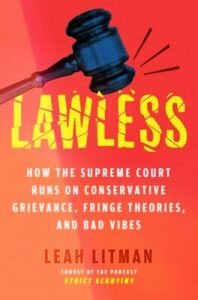Podcast: Play in new window | Download
Lawless: How the Supreme Court Runs on Conservative Grievance, Fringe Theories, and Bad Vibes
Today, Republicans are the ruling party in the United States. They control the presidency, the Senate, and the House of Representatives. But they also control the Supreme Court, which is the one institution that is supposed to oversee the legality and constitutionality of what the other two branches do. The Supreme Court has a super majority of six conservative justices, all of whom were appointed by Republican presidents, and three of whom were appointed by Donald Trump himself.
We are joined today by Prof Leah Litman, the author of a compelling and timely new book, Lawless: How the Supreme Court Runs on Conservative Grievance, Fringe Theories, and Bad Vibes. Prof Litman’s premise is that the “the Supreme Court is repeatedly elevating the feelings, sentiments, and political views of the Republican Party” and that the conservative justices consistently reach pre-ordained results that strictly conform to the Republican platform and then they justify those outcomes using high-minded judicial language to give the patina of objectivity. She points out that “Republican-appointed justices seem to think that the real victims of discrimination today are the Republicans, who no longer enjoy the kind of outsize influence, political power, and social standing they once did.”
Guest – Leah Litman is a professor of law at the University of Michigan and a former law clerk to Justice Anthony Kennedy. She is a co-host of the popular podcast Strict Scrutiny and she received the Ruth Bader Ginsberg award for “scholarly excellence” from the American Constitution Society.
—–
US Supreme Court Revokes Legal Protection of Venezuelan Nationals
In an emergency order issued on May 19, the U.S. Supreme Court allowed the Trump administration to revoke legal protections that the Biden administration had granted to hundreds of thousands of Venezuelan nationals.
Only one justice publicly dissented: Ketanji Brown Jackson. Just days earlier, at a legal conference, Jackson delivered the Court’s strongest public rebuke yet of Trump-era attacks on judges who have blocked Trump’s policies on immigration, halting federal grants and contracts, and firing government workers. Her 18-minute speech earned a standing ovation.
In January, the Trump administration announced plans to end Temporary Protected Status (TPS) for Venezuelan nationals—a designation that shields individuals from deportation due to civil unrest and unsafe conditions in their home country. The U.S. has seen a sharp rise in its Venezuelan population, driven by mass displacement stemming from Venezuela’s ongoing political, economic, and humanitarian crises.
Earlier, on March 31, U.S. District Judge Edward Chen issued a nationwide injunction blocking the termination of TPS, preserving protections for an estimated 350,000 Venezuelans and allowing them to continue working legally until at least October 2026, or until the legal challenge was resolved. Judge Chen raised concerns that the administration’s move may have been discriminatory and lacked a sound legal basis. The National TPS Alliance.
Guest – UCLA law professor Ahilan Arulanantham is a leading civil rights attorney and former MacArthur Foundation Fellow. Before joining UCLA, he spent nearly two decades at the ACLU of Southern California, the last two as Senior Counsel. He previously served as a federal public defender in Texas, and clerked on the Ninth Circuit Court of Appeals. Widely recognized for his work defending immigrant rights, he has twice been named California Lawyer of the Year and is a multiple-time honoree on the Daily Journal’s Top 100 Lawyers list.
————————————




